Kevin DeYoung's Blog, page 34
September 26, 2016
Distinguishing Among the Three Persons of the Trinity within the Reformed Tradition
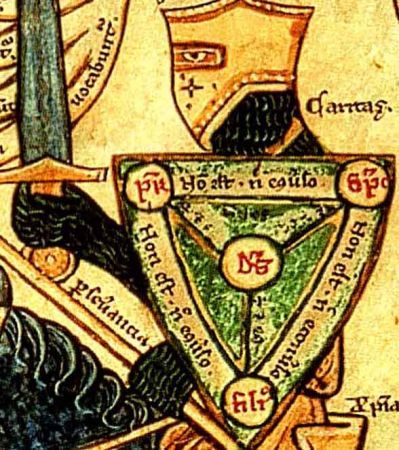 Up to this point I’ve not attempted to make any contribution to the Trinitarian debates that have been cascading across the internet (and beyond) for the past several months. My public silence on the issue—and I’ve talked at length in private with many individuals—has been owing to three factors.
Up to this point I’ve not attempted to make any contribution to the Trinitarian debates that have been cascading across the internet (and beyond) for the past several months. My public silence on the issue—and I’ve talked at length in private with many individuals—has been owing to three factors.
1. I was on study leave for a good chunk of the summer and simply haven’t had the time to put pen to paper (as it were). Time is always an issue when it comes to these kinds of debates, especially when the discussion is constantly growing and incredibly technical.
2. I am not an expert in fourth century-Patristic thought, nor am I an expert in Trinitarian theology more broadly. My area of academic interest and specialization has focused on Late Reformed Orthodoxy of the seventeenth century, through the Scottish Kirk of the eighteenth century, into the origins of Old Princeton in the nineteenth century. Not irrelevant to the debate, but not at the heart of it either. I have been trying to sit back and learn from theologians and historians who know more than I do.
3. There are friends and people I respect on both sides of this debate. Does that mean we should never enter the fray when friends are involved? Of course not. But if we’re honest, most of us (though not all!) are more cautious about throwing elbows if we think we might hit someone we know. Let’s not forget—and I’m speaking to myself here too—that on the other side of the internet connection are real people who often feel the barbs and the snark and the accusations more than we realize. That doesn’t mean we can’t criticize. It does mean we should pursue the mind and heart of Christ at all times, especially when we criticize.
So why I am writing something now? For the simple reason that I am hearing from more people in my own congregation who want to know what to make of this kerfuffle over the Trinity. Twitter demands to “say something!” mean little to me. Honest theological questions from my church family mean a lot.
Opening Reflections: Now and Then
I won’t try to summarize the debate—there have been hundreds of posts and tweets and comments back and forth—except to say from the outset that I think there are important ways in which some proponents of the “eternal subordination of the Son” (ESS), or “eternal relations of authority and submission” (ERAS), or “eternal functional subordination” (EFS) are out of step with the Reformed tradition.
This is what I wrote in my (now out of print) book Freedom and Boundaries:
The Father and the Son share the same essence and rank, and yet in their relationship, the Son submits to the Father while the Father never submits to the Son. No inferiority. No inequality. Yet, different roles. Granted, complementarians sometimes speak too quickly about the “eternal subordination of the Son.” It is better to say that there has always been an “order” (taxis) in the Trinity—an order not of rank, but of well-arranged relationships. The Father sends the Son, and the Father and the Son send the Spirit, and the relations are not reversible. Mutuality and equality exist in the Trinity alongside a divinely instituted order. Calvin writes, “For even though we admit that in respect to order and degree the beginning of divinity is in the Father, yet we say it is a detestable invention that essence [being] is proper to the Father alone, as if he were the deifier of the Son.” With the Trinity as our model, then, we understand that authority and God-given order in the church, or, headship and submission in marriage, are not inconsistent with equality of personhood. (61)
I’m somewhat pleased with this paragraph, which I first wrote back in 2003 or 2004 when I was 26 or 27 years old (the book was later published in 2006). On the one hand, if we are talking about the economic Trinity—the activity of God and the work of the three Persons in creation and redemption—we can certainly say (as I did) that the Son submits to the Father, while the Father does not submit to the Son. We should not cry foul every time we see the word “submission.” That point notwithstanding, I have never been comfortable with the language of eternal subordination, and I’m glad I said so in print ten years ago
On the other hand, the biggest thing I would change is steering clear of the Trinitarian analogy altogether as a defense of complementarianism. I do think there is an important point to be made from the God-Christ parallel in 1 Corinthians 11:3—namely, that headship does not imply ontological inferiority. But even here we should be careful to note, as Carlton Wynne recently brought to my attention, that there is an “economic” expression of the Son in view in verse 3 (“Christ”), not an immanent or ontological expression. On balance, I would no longer try to use the Trinity “as our model” for the marriage relationship, both because it is not necessary for complementarianism to be true and because the metaphysical inner workings (if that’s the right term) of the ineffable Trinity do not readily allow for easy lifestyle applications. In fact, it is striking how the New Testament often grounds ethical imperatives in the gospel (e.g., marriage as an outworking of Christ and the church), but never in the eternal “ordering” of God.
Furthermore, I do not think the talk of “roles” is the best way to speak of the eternal distinctions between the Persons of the Trinity. There is a way that “role” can be an appropriate term, if we mean that the Father, Son, and Holy Spirit are not interchangeable in the work they accomplish and in what they accomplish. But I’m more skittish about “role” language than I used to be. It can too easily undermine important doctrines like:
the simplicity of God (the idea that God is not the composite of parts and that whatever each Person is singly, the whole Trinity is together),
the unity of the divine will (the idea that though God exists in three Persons, the Triune God does not have three separate wills—a necessary doctrine if the three Persons share the same nature, since “will” is a property of nature not of persons),
and the inseparable operations of the Trinity (the idea that the external works of the Trinity are indivisible, that each Person is operative in all God’s external works).
Traditionally, the way in which the Persons of the Godhead have been distinguished—and they are distinct (which suggests three hypostases) not different (which would suggest another ousia)—is not by roles or by eternal relations of authority and submission, but by paternity, filiation, and spiration. To put it another way, the Father is the Father (and not the Son or the Spirit), the Son is the Son (and not the Father or the Spirit), and the Spirit is the Spirit (and not the Father or the Son) by virtue of the Father’s unbegottenness as Father, the Son’s generation from the Father, and the Spirit’s procession from the Father and the Son.
I’ll come back to the significance of this language at the end, but first—with the theology of the preceding paragraph in mind—let’s try to get a sense for how the Persons of the Trinity have been described in the Reformed tradition.
The Trinity in the Reformed Tradition
Obviously, it would be beyond the scope of a blog post to canvass the entire Reformed tradition and its explanation of the Trinity. Instead, I want to focus doctrinally on the way in which the Persons of the Godhead have been distinguished and focus historically on a few Reformed representatives. To that end I’ve chosen five theologians from five different centuries: Zacharias Ursinus (1534-1583) from the sixteenth century, Benedict Pictet (1655-1724) whose Christian Theology came out at the end of the seventeenth century, Wilhelmus à Brakel (1635-1711) whose systematic theology was published at the beginning of the eighteenth century, Charles Hodge (1797-1878) from the nineteenth century, and Louis Berkhof (1873-1957) from the twentieth century. Why these five? For starters, because I have them on my shelf! But also because they come from different regions (German, Swiss, Dutch, American), over different centuries, and represent two different streams of Reformed theology in America: the Dutch tradition through Berkhof (who condensed and summarized Bavinck, with roots in à Brakel) and the Old Princeton tradition (which came to fruition in Hodge, who was influenced by Francis Turretin and Turretin’s successor in Geneva, Benedict Pictet).
1. Zacharias Ursinus, Commentary on the Heidelberg Catechism (1591)
In his explanation and defense of the divinity of Christ, Ursinus raises and refutes a number of “sophisms of heretics against the eternal Deity of the Son” (200-201). The eighth sophism is that “The Son has a head and is less than the Father. Therefore he is not one and the same essence with the Father.” To this Ursinus replies, “The Son has a head in respect to his human nature, and his office as mediator. These things, however, do not detract any thing from his Divinity.” Similarly, in responding to the eleventh sophism, Ursinus argues that “The Father, therefore, is greater than the Son, not as to his essence, in which the Son is equal with the Father, but as to his office and human nature.” And later, he adds, “Inequality of office does not take away equality of nature of persons.”
This discussion of the Son’s divinity flows from Ursinus’s analysis of the Trinity. Ursinus asks a question we will come back to throughout this post: “How are the three Persons of the Godhead distinguished?” They are distinguished, he answers, in two ways: (1) by their works ad intra and (2) by their mode of operating ad extra.
The first point has to do with the way in which the three Persons relate to one another. As one God, the three Persons are distinguished not by essential properties (characteristics related to essence) but by their personal properties (sometimes called “incommunicable properties); namely, that the Father exists of himself, the Son is begotten eternally from the Father, and the Holy Spirit proceeds eternally from the Father and the Son. In this sense, there is an “order” in the Trinity. The Father is the first person because he is the fountain of divinity. The Son is the second person because the Deity is communicated to him from the Father. And the Spirit is the third person because the Deity is communicated to him from the Father and the Son. None of this means that the Son or the Spirit became God; generation and procession are from eternity (135).
The second point about ad extra, which has to do with how the three Persons operate out of themselves toward their creatures, follows from the first point about ad intra. Ursinus argues that while all the works toward their creatures come by the common will and power of the Father, Son, and Holy Spirit, yet at the same time there is an order to their inseparable external operations. The Father works by the Son and the Holy Spirit, but the Son and the Spirit do not work by themselves. In their external operations, the Father sends the Son, and the Son works through the Spirit, sending him from the Father. In other words, the Son and the Spirit were “sent into the world, not because they began to exist where they did not exist before; but because they accomplished in the world what was the will of the Father, and showed themselves present and efficacious according to the will of the Father” (137).
2. Benedict Pictet, Christian Theology (1696)
In distinguishing between the three Persons of the Trinity, Pictet explains that we are determining what can be said of the Father that cannot be said of the Son, and what can be said of the Spirit that cannot be said of the Father and Son (and so on). Like Ursinus, Pictet relies on generation and procession to make these distinctions: “The Father is said to have begotten the Son; but the Son is no where said to send the Father. The Spirit is said to proceed from the Father, and to be sent by the Son; but no where is the Father said to proceed from, nor the Son to be sent by, the Spirit” (99).
Pictet is careful to safeguard the equality of the three Persons even in the midst of these distinctions. Eternal generation (which Pictet claims no mortal can fully comprehend) distinguishes the Son from the Father, but it does not make the Son something less than the Father. “Again,” Pictet writes, “if the Son is said in any passage to be inferior to the Father, and to work by the power of Father, such passage only shows that there is something in Christ besides the divine nature, viz. the human nature, according to which he is inferior to the Father, and also that there is a certain order of operation between the Father, Son, and Holy Ghost, and a kind of economy; but it by no means proves that Christ, as God, is inferior to the Father” (107). The Father is placed first because he begets the Son and together with the Son sends the Spirit, but he is not before the Son or the Spirit in age or time, nor does he excel them in dignity, glory, majesty, or power. In short, the three Persons share the same perfections (101).
3. Wilhelmus à Brakel, The Christian’s Reasonable Service (1700)
According to à Brakel, there is more to Nicene orthodoxy than an affirmation of a shared essence. All three Persons of the Trinity must be described as having not only co-essence (homoousia), but also co-equality (isotes) and co-existence (emperichoresis). The Persons are distinguished from each other, but not different: “They coexist as one God, in simplicity of Being” (1:145).
So how, then, are the Persons to be distinguished? à Brakel lists five ways: (1) in personal properties, (2) in names, (3) in order, (4) in the manner of existence, and (5) in the manner of operation. Of these five distinctions, the first is the most important because it is the foundation for the other four. In keeping with the Reformed (and orthodox) tradition, à Brakel relies on the personal properties to distinguish among the three Persons of the Godhead. “This one divine Being subsists in three Persons, not collaterally or side-by-side, but rather the one Person exists by virtue of the other Person either by way of generation or procession” (1:141). Or again, “the Father generates; the Son is generated; and together with the Father sends the Holy Spirit; the Holy Spirit proceeds from the Father and the Son, whose manner of operation is described in Scripture as ‘breathing’” (1:147). The way in which the three Persons operate in the world, the order in which they are named, and even the names themselves (Father, Son, and Holy Spirit) find their basis in paternity, filiation, and spiration/procession (1:161-62).
Given this emphasis, à Brakel makes sure there is no confusion about the nature of generation and procession. “The words ‘generate’ and ‘proceed’ neither suggest superiority or inferiority nor the transformation from nothing to something, for all this is an eternal relation” (1:174). The Father may operate of his own existence, the Son from the Father, and the Spirit from the Father and the Son, but this does not imply dependence or imperfection among the members of the Trinity (1:175). Over and over à Brakel reminds us that we are dealing with mysteries that cannot be fully explained and must not be understood by way of human analogy.
One other point bears mentioning. In his explanation of the covenant of redemption (pactum salutis), à Brakel asks how there can be a transaction between the Father and the Son since they are one in essence and have one will and objective? He says in reply, “As far as Personhood is concerned the Father is not the Son and the Son is not the Father. From this consideration the one divine will can be viewed from a twofold perspective. It is the Father’s will to redeem by agency of the second Person as Surety, and it is the will of the Son to redeem by His own agency as Surety” (1:252). On the one hand, then, à Brakel allows that we should not so emphasize the one will of God as to erase the eternal covenant made between the Father and the Son. At the same time, it is striking that à Brakel never describes the pactum in terms of authority and submission. Rather, the Father and the Son commit to the same objective by means appropriate to their own personal properties.
4. Charles Hodge, Systematic Theology (1871-73)
Hodge also distinguishes the three Persons—which he insists are “one God, and therefore have one mind and will”—according to their personal properties. “Paternity, therefore, is the distinguishing property of the Father; filiation of the Son; and procession of the Spirit” (1:461). These are the facts of Scripture, Hodge asserts, and affirmed by the ecumenical creeds, although no attempt can be made to fully explain these mysteries.
Like Ursinus, à Brakel, and Pictet, Hodge is eager to safeguard the equality of the three Persons, making clear that they share the same essence and the same “infinite perfections” (1:460). Hodge differs, however, in employing the word “subordination” to describe the ordering of the Son and the Father and the ordering between the Spirit and the Father and Son. This subordination “does not imply inferiority,” but only “concerns the mode of subsistence and operation, implied in the Scriptural facts that the Son is of the Father, and the Spirit is of the Father and the Son, and that the Father operates through the Son, and the Father and the Son through the Spirit” (1:461). The sameness of essence precludes all notions of priority and superiority as to being and perfections among the three Persons, but “it does not preclude subordination as to the mode of subsistence and operation” (1:464). Hodge goes so far as to say, “We have here the three essential facts involved in the doctrine of the Trinity; namely, unity of essence, distinction of persons, and subordination without any attempt at explanation” (1:467). Clearly, Hodge believes in some kind of subordination of the Son and the Spirit. Whether he means the same thing as contemporary proponents of the term, and something different from the earlier Reformed tradition, is a question we will come back to at the end.
5. Louis Berkhof, Systematic Theology (1938)
There is little in Berkhof’s explanation of the Trinity that should surprise anyone familiar with the Reformed tradition. He affirms that there is in the Divine Being but one indivisible essence, and that in this Being there are three Divine Persons or individual subsistences (87). On this latter point, Berkhof helpfully reminds us that there are not three individuals in the Godhead, alongside of and separate from each other, but rather “personal self-distinctions within the Divine essence” (87). Perhaps this is why theologians in the Reformed tradition tend to talk of order and operations instead of roles and relationships. The first pair of terms suggests self-distinctions, while the second pair suggests separate individuals.
Berkhof affirms that the three Persons are “marked by a certain definite order.” This is not an order pertaining to time or essential dignity, only to subsistence and operation. From here, Berkhof makes the same points Ursinus made four centuries prior about unbegottenness, generation, and spiration ad intra and the unified but ordered works of creation and redemption ad extra. In other words, Berkhof argues that the three Persons are distinguished not by essence or perfections, but (1) by their personal properties and (2) by the way in which the works of the Triune God are presented to us in Scripture as coming from the Father through the Son and the Holy Spirit.
Summarizing the Reformed Tradition
Although there are important differences among the five authors selected, the substance of the doctrine is remarkably similar across the centuries, so much so that I think we are safe to highlight a number of points as being central to the doctrine of the Trinity in the Reformed tradition.
The three Persons are distinguished by their personal properties: by the Father’s paternity (or unbegottenness, or agennesia), the Son’s generation (or filiation), and the Spirit’s procession (or spiration, or being sent).
We are right, therefore, to speak of a certain order (taxis) in the Trinity. In this way, in a very qualified sense, some have spoken of the Father being greater than the Son, or the Son being subordinate to the Father.
This language, however, if used at all, is always carefully guarded so as not to undermine the unity of the Persons as having one essence and one will and sharing in all the same perfections. There can be no dependence or contingency in the immanent Trinity.
The three Persons are also distinguished by their economic, voluntarily willed modes of operation: in the one work of the Triune God, the Father works by the Son; and the Son works, together with the Father, through the Holy Spirit.
The doctrine of the Trinity, though clearly revealed in Scripture and affirmed in the ecumenical creeds, is mysterious and beyond human comprehension.
So where does this leave us concerning the current debate over the eternal subordination of the Son? While I think the accusations and recriminations have not always been fair or balanced, I do think there are several ways some of my friends on the eternal subordination side of the debate (and I realize those in favor of ESS or ERAS or EFS do not all make the same points) are decidedly out of step with the Reformed tradition, and perhaps more broadly out of sync with the totality of what Nicea meant to affirm and protect.
Evaluating Eternal Subordination
Let me mention three specific areas of concern, all of which have been hinted at already.
First, I question whether the language of roles and relationships is the best way to describe the distinctions among the three Persons of the Trinity. The theology surrounding the Trinity is technical and complex. Many of the words in question—like “subordination” and “roles”—can be used in ways that are orthodox. We should listen to each other carefully and not assume the worst. At the same time, unless we have good reason to do otherwise, it is best to stick with the theological vocabulary that has served the church for centuries. “Role” is a word with connotations of the theater and a part to be played. Roles tend to be things we take on or enter into. My wife and I can have different roles in marriage because we are different individuals, each with a unique individualized nature. Once I was not a husband, but now that I am I take on a certain role in the marriage relationship. The Father, Son, and Holy Spirit, by contrast, are personal self-distinctions (subsistences) within the Divine essence. They exist from eternity in each other, not separate from and alongside each other. This makes the language of roles less appropriate when talking about the inner dynamics of the Trinity from all eternity.
Second, even when the language of subordination is used in the Reformed tradition, it is not used in the way some ESS proponent imagine. Wayne Grudem, for example, often points to Hodge as evidence for widespread and longstanding belief in the eternal subordination of the Son. But Hodge clearly limits his use of “subordination” to the mode of subsistence and operation. The word does not imply authority for Hodge, but simply a sub-ordering (i.e., an ordering under) in which the Father is the first person of the Trinity, the Son the second, and the Spirit the third. Hodge is saying nothing different than Ursinus or Pictet or à Brakel did before him. They all argue for a certain order in the Trinity related to personal properties ad intra and operations toward the world ad extra. None of them equates order (or sub-order) with roles of authority and submission. The error is, no doubt, an honest one, but it’s simply not the case that taxis means in the Reformed tradition what it means for Grudem.
Finally, and most crucially, I find that some proponents of ESS answer Ursinus’s question—“How are the three Persons of the Godhead distinguished?”—in a way that is foreign to, and really at odds with, the Reformed tradition. All five representatives (Ursinus, Pictet, à Brakel, Hodge, and Berkhof) answer that question by starting with the same foundation: paternity, generation, and procession. Not incidentally, this is the explicit teaching in both the Three Forms of Unity (Belgic Confession Article 8) and even more clearly in the Westminster Standards (WLC 9, 10). The distinctions among the three Persons only hold in place if the Father is unbegotten, the Son is begotten of the Father, and the Spirit proceeds from the Father and the Son. This Scriptural and creedal formula is the sine qua non of Trinitarian theology, at least when it comes to distinguishing among the Persons of the Godhead.
And yet, this is not how many of the proponents of ESS distinguish among the three Persons. In his Systematic Theology, Grudem argues, “The only distinctions between the members of the Trinity are in the ways they relate to each other and to creation” (emphasis original, 251). So far this sounds a lot like the usual business about ad intra and ad extra. But then instead of talking about subsistences or modes of operation, Grudem argues that the distinctions among the three Persons can be summarized as “equal in being but subordinate in role.” Grudem may not explicitly deny the Nicene language of “begotten” and “proceeds” (though in a subsequent edition of his Systematic Theology he argues that we should no longer retain “eternal generation” in modern theological formulations), but he assumes “subordination in role” simply says the same thing and says it better. Because Grudem equates the personal properties of Nicea with authority and submission within the immanent Trinity, he insists that without eternal subordination you cannot even have a Triune God (251). Without the doctrine of the Son’s eternal subordination to the Father in role or function, Grudem maintains, “we would lose the doctrine of the Trinity, for we would not have any eternal personal distinctions between the Father and the Son, and they would not eternally be Father and Son” (245, fn. 27). It seems that Grudem—whom, it should be said, has been a blessing to me and my church in many of his writings—is either unfamiliar with the way in which the Persons are distinguished in the Reformed tradition or finds the tradition inadequate. He prefers what these representatives of the Reformed tradition decidedly do not: to distinguish among the Persons of the Trinity by the means of eternal subordination instead of eternal generation. This is not a small switch.
Likewise, Owen Strachan and Gavin Peacock (I’ve met Gavin before, and Owen is a friend) follow in Grudem’s footsteps when they write: “There is order. The Father is the Father because He sends the Son. The Son is the Son because He submits to the Father’s will. The Spirit is the Spirit because the Father and the Son send Him. There is no Holy Trinity without the order of authority and submission” (The Grand Design, 93). To be fair, this is not a book about the Trinity per se, and I know Owen and Gavin do not want to reject eternal generation, but I still wish they had worded things differently. Setting aside whether the Son submits to the Father from eternity or not, it’s the word “because” that is most problematic. The Father does send the Son, and the Son does submit to the Father, and the Spirit is sent by the Father and the Son. But Owen and Gavin, perhaps unwittingly, are answering Ursinus’s question in a way that the Reformed tradition would not. The Father is the Father because of unbegottenness; the Son is the Son because of filiation; the Spirit is the Spirit because of procession. There is no Holy Trinity without the order of paternity, generation, and procession, which is not another way of saying the three Persons must be distinguished on the basis of authority and submission or there is no Trinity.
In a similar vein, it seems to me Bruce Ware (whom I also respect and appreciate) argues that eternal submission is the Son’s unique personal property in addition to eternal generation (One God in Three Persons, 237-248). This is better than rejecting the language of paternity, filiation, and procession, but still a deviation from the Reformed tradition. It is one thing to point out that the Son’s willing submission is, on some level, an expression of his filial identity (as Scott Swain puts it), quite another to bring eternal subordination into the life of the immanent Trinity and nest it with (or replace altogether) the traditional personal properties.
Obviously, there is much more that could be said about the doctrine of the Trinity, from Augustine and the Fathers, to the Reformed tradition, to the revival of Trinitarian interest in recent decades, to the detailed arguments for and against the eternal subordination of the Son in journals, books, and blogs. I make no pretense of having the last word or anything close to a definitive word on the subject. But as I’ve studied the words of some ESS/ERAS/EFS proponents more closely and have read from the Reformed tradition more deeply, I’ve come to see there is a gap between the two that is more significant than may seem at first glance.
September 22, 2016
The Attraction of Idolatry
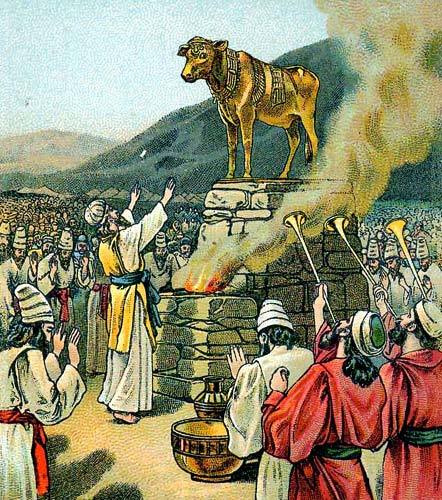 We know as Christians, on an intellectual level, that we have idols—be it family, food, football or whatever. But to see the allure of idolatry can be hard for those of us in the Western world.
We know as Christians, on an intellectual level, that we have idols—be it family, food, football or whatever. But to see the allure of idolatry can be hard for those of us in the Western world.
That’s why I appreciate the points laid out by Doug Stuart in his Exodus commentary (450-54). Stuart suggests nine reasons idolatry was attractive to the Israelites and in the cultures of the Ancient Near East.
1. It was guaranteed. If you do the right incantation, you get the right results. Just say the right words and the gods show up. Who wouldn’t want that?
2. It was selfish. In the ancient world, the gods, though they were powerful, needed humans to feed them. Sacrifices were brought to the gods because they were hungry. Consequently, you can get what you want from the gods simply be bringing them the sacrifices they need
3. It was easy. Sure, you need to show up and offer your sacrifice, but ancient religion demanded little in the way of ethical standards or personal sacrifice. To be a good Canaanite, you didn’t have to follow an elaborate moral code. You just had to put the meat on the altar. That was the mistake Israel fell into time after time. They thought they could live and worship anyway they wished, so long as they kept up with the religious rituals.
4. It was convenient. There were religious franchises all over the place. That’s why Israel got in trouble with their high places. They thought they could take care of their ritual duties just like everyone else. Israel was unique, however, in that there was only one place to go to—first to the tabernacle and later the temple.
5. It was normal. The only people who did not do religion like this in the ancient Near East were the Israelites. For everyone else, though they had gods with difference names and in different places, religion was done the same way.
6. It was logical. It made sense that there were lots of gods who specialized in one area of blessing or held sway over one part of the cosmos.
7. It was pleasing to the senses. There was an appeal to aesthetics and beauty. There was something to see and do in idolatrous worship. It was more entertaining and probably felt more relevant.
8. It was indulgent. Meat was a relative rarity in the ancient world. Not everyone had herds that they could sacrifice, so meat was often eaten only as a part of ritual worship. You would offer your meal, and in some cases you drink, to the god and then enjoy the feast yourself. As a result, worship took on a party atmosphere, filled with gluttony and drunkenness.
9. It was erotic. During ritual worship it was believed that if worshipers took the parts of Baal and Asherah (for example) and had sex, it would stimulate the deities in heaven to have sex. And when the gods and goddesses had sex, it meant procreation, which meant earthly blessings like fertility, rain, health, and good harvests. This is why prostitution became common at religious sites and why God rebuked Israel for adopting the same practice with both heterosexual and homosexual temple prostitutes.
The whole system of idolatry—guaranteed, selfish, easy, convenient, normal, logical, pleasing, indulgent, and erotic—when you look at it that way, the allure of idolatry does not seem far removed from us. It is easy to see how we can make idols out of everything from health insurance to retirement accounts to political candidates to academic approval to sports to entertainment to Facebook to food and sex.
What God was telling Israel was not easy for them, nor is it easy for us, but we must fight the good fight of faith and shun all idolatry. No matter common and no matter how attractive.
September 20, 2016
Love One Another With Brotherly Affection
Anyone who follows the sport of triathlon–I started paying attention a couple years ago–knows of the Brownlee brothers. Alistair Brownlee is a two-time Olympic gold medalist for Great Britain (2012, 2016), while his younger brother Jonny placed third in London and second in Rio. Rarely do you see an Olympic distance triathlon (1.5k swim, 40k bike, 10k run) without one or both of the Brownlees challenging for the win.
Even if you don’t care a jot or tittle about the sport, you have to be a fan of this video. At the end of the World Triathlon Series event (the last of the season) in Mexico, after an hour and forty-five minutes of extreme exertion in 90 degree heat and humidity, big brother gave up his chance at victory to help his little brother cross the line in front of him (and not die!).
I think I’m going to make my oldest boys, both of whom run middle school cross country, watch the video (or this version). Just so they know what’s the right thing to do if they see the other go wobbly. And in case you’re wondering if helping your brother across the line is legal, apparently it is, at least if you are both participants.
Well done, Alistair (who, like a real big brother, said afterward that he wished “the flippin idiot had just paced it right”).
September 19, 2016
Four Questions for Obeying the First Commandment
 “You shall have no other gods before me” (Exodus 20:3).
“You shall have no other gods before me” (Exodus 20:3).
Nine commandments proscribe (or prescribe) certain actions for God’s people. The first commandment, however, is unique in that it regulates a certain relationship between God and his people. Biblical morality is predicated upon the reality that there is only one God, and he must be worshiped to the exclusion of all others.
So what does that look like?
In the Institutes of the Christian Religion, Calvin insists that obedience to the first commandment means we owe God four things (II.viii.16).
Adoration. We render God worship and pay homage to his majesty.
Trust. We rest happy and secure in God’s power and perfections.
Invocation. We seek out God’s promised aid in our time of need.
Thanksgiving. We recognize God as the fount of every blessing.
That’s a helpful checklist, not only for obeying the first commandment, but also for a number of expressions of devotion to God. What should we do in prayer? Try adoration, trust, invocation, and thanksgiving. What should we find in our corporate worship services? Plan for adoration, trust, invocation, and thanksgiving. What can we talk about with our friends in the car, our family at the dinner table, or our kids at bedtime? How about adoration, trust, invocation, and thanksgiving.
I’ve also found it useful to turn Calvin’s first commandment obligation into four questions for personal reflection.
1. Whom do I praise? Obviously, it’s not wrong to encourage others or enjoy their gifts. But where do I place my marvel? What do I find truly amazing? What ultimately excites me most? What am I most likely to sing about, shout about, and celebrate?
2. Whom do I count on? We sing the song “I Need Thee Every Hour,” but functionally who or what is the Thee in our heart of hearts? Are we counting on football or ice cream or alcohol or a boyfriend or a child or a new job to meet our needs?
3. Whom do I call for? To be sure, God normally works through means, which means we call the plumber when our drain is clogged and call the doctor when an artery might be clogged. Yet when it comes to daily petition and constant prayer—in our mundane disappoints to our most desperate moments—where do we really think our help comes from?
4. Whom do I thank? No matter what difficult season we may be in, there are far more blessings than we realize. How do we say thank you for sunny days and needed rain and sleeping babies and holding hands and mile high nachos? The object of our gratitude reveals the focus of our faith.
The questions are not meant to make you (or me) despair of ever obeying the first commandment, but if they can point us in the direction of true devotion, then Calvin would be pleased. More importantly, so would God.
September 18, 2016
Monday Morning Humor
September 14, 2016
Seven Principles for Angry Parents Disciplining Angry Children
 I hate to admit that the title of this blog post too often describes my household. I never (or at least it seems that way to me) lose my temper with my wife, my staff, or my congregation. But sadly, I too often feel (and act?) like that little Anger guy from Inside Out when it comes to my kids. Too many frustrated sighs and raised voices and sharp tones (and that’s just from the parents!).
I hate to admit that the title of this blog post too often describes my household. I never (or at least it seems that way to me) lose my temper with my wife, my staff, or my congregation. But sadly, I too often feel (and act?) like that little Anger guy from Inside Out when it comes to my kids. Too many frustrated sighs and raised voices and sharp tones (and that’s just from the parents!).
In Ephesians 6:4, God tells fathers—though I think it’s okay for moms to listen in—to raise children in the discipline and instruction of the Lord. He also warns against provoking our children to anger. So how do we do one without the other? How do we discipline exasperating kids without in turn exasperating them unnecessarily?
Commenting on Ephesians 6:4, Martyn Lloyd-Jones offers seven principles to govern our disciplinary action as parents (Life in the Spirit, 278-84). The headings and commentary are mine. The quotations are the Doctor’s.
1. Self-Control
“We are incapable of exercising true discipline unless we are first able to exercise self-control, and discipline our own tempers” (278).
The goal is for children to be less angry, not for parents to join them in their fury. An explosion of anger often feels good, and it may even yield short-term results, but the fruit is behaviorism more than gospel sweetness. I can think of many times I’ve had to go back to my kids later and tell them I was sorry for responding to their sin in a sinful way.
2. Predictability
“If a parent is to exercise this discipline in the right way he must never be capricious. There is nothing more irritating to the one who is undergoing discipline than a feeling that the person who is administering it is capricious and uncertain. There is nothing more annoying to a child than the kind of parent whose moods and actions you can never predict, who is changeable, whose condition is always uncertain. There is no worse type of parent than he who one day, in a kindly mood, is indulgent and allows the child to do almost anything it likes, but who the next day flares up in a rage if the child does scarcely anything at all” (279).
Well, Lloyd-Jones is 2-for-2 in nailing me as a parent. I wish it weren’t so, but some days I’m all sugar canes and lollipops (literally, to my wife’s chagrin). And then when I’m tired and stressed, the fuse gets real short real fast. How will my children know how I expect them to act if they don’t know what to expect from my actions?
3. Willing to Listen
“Another most important principle is that the parent must never be unreasonable or unwilling to hear the child’s case. There is nothing that so annoys the one who is being disciplined as the feeling that the whole procedure is utterly unreasonable. In other words, it is a thoroughly bad parent who will not take any circumstances into consideration at all, or who will not listen to any conceivable explanation” (280).
I know Lloyd-Jones is right in theory, but then I think: he never met a 21st-century American child. It seems like our kids always have an excuse for their sin. They are always ready to rationalize. When discipline is coming, the kids suddenly transform into the world’s most penetrating logicians, ready with the legal acumen of Maimonides. Certainly, children can make this principle difficult to carry out. And yet, we must not think we always have all the facts squared away. If we could calmly listen—just for a minute and then move on—we might learn something, and our kids might be more trusting.
4. Not Selfish
“But there is another principle to be considered—the parent must never be selfish. . . . My charge applies to persons who do not recognize that the child has his own life and personality, and who seem to think that children are entirely for their pleasure, or for their use” (281).
Hmm, that’s a good reminder. Even at their worst moments, my children are more than distractions to my progress or obstacles to tranquility. They are image bearers made by God and loved by God. They feel things just like I do. They are human beings, not personal projects or impediments.
5. Not Mechanical
“Punishment, discipline, must never be administered in a mechanical manner. There are people who believe in discipline for its own sake. That is not biblical teaching, but the philosophy of the Sergeant Major. . . . It must never be thought of in terms of pressing a button and expecting an inevitable result to follow. That is not true discipline; it is not even human. That belongs to the realm of mechanics. But true discipline is always based on understanding; it has something to say for itself; it has an explanation to give” (282).
If your favorite parenting book has page after page of simple, fool-proof formulas for turning disobedience into correction into heartfelt submission, you’ll probably get more benefit from those pages by ripping them out and using them as wet wipes. We can’t train our kids like that dude trained the raptors in Jurassic World. Our kids are more complicated than raptors (and hopefully less violent).
6. Not Severe
“Discipline must never be too severe. Here is perhaps the danger that confronts many good parents at the present time as they see the utter lawlessness about them, and as they rightly bemoan it and condemn it. Their danger is to be so deeply influenced by their revulsions as to go right over to this other extreme and to become much too severe. The opposite of no discipline at all is not cruelty, it is balanced discipline, it is controlled discipline” (283).
It is possible to be too “conservative” in our discipline. Kids need boundaries, not bruises. They need rebuke, not berating.
7. Letting Them Grow Up
“We must never fail to recognize growth and development in the child. This is another alarming parental defect which, thank God, one does not see now so often as formerly. But there are still some parents who continue to regard their children all their lives as if they had never outgrown their childhood. The children may be 25 but they still treat them as if they were 5″ (284).
Your kids will always be your kids. But they won’t always be messy toddlers or mouthy pre-teens or moody high schoolers or know-it-all college kids. Or so I’m told. We need to let God do the work only he can do, and trust he will do all the work we can’t. Kids grow up. And so should parents.
September 12, 2016
Book Briefs
Here are some of the books I read over the summer.
 S.C. Gwynne, Rebel Yell: The Violence, Passion, and Redemption of Stonewall Jackson (Scribner, 2014). A tremendously well-written biography, with a deft touch for pacing, narrative flow, and the use of flashback storytelling. Although the approach is “popular history,” Gwynne—a journalist and Pulitzer Prize finalist—has clearly done his historical homework. The result is a sympathetic, yet unflinching, portrayal of one of the most daring, ferocious, tender, rigid, romantic, severe, spiritual, eccentric, innovative, and “immortal” Americans this country has ever produced.
S.C. Gwynne, Rebel Yell: The Violence, Passion, and Redemption of Stonewall Jackson (Scribner, 2014). A tremendously well-written biography, with a deft touch for pacing, narrative flow, and the use of flashback storytelling. Although the approach is “popular history,” Gwynne—a journalist and Pulitzer Prize finalist—has clearly done his historical homework. The result is a sympathetic, yet unflinching, portrayal of one of the most daring, ferocious, tender, rigid, romantic, severe, spiritual, eccentric, innovative, and “immortal” Americans this country has ever produced.
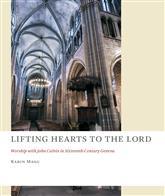 Karin Maag, Lifting Hearts to the Lord: Worship with John Calvin in Sixteenth-Century Geneva (Eerdmans, 2016). Designed for us as a textbook, this book is at once a beginner’s introduction to worship in Calvin’s Geneva and a rich collection of primary source materials. Seminary students, pastors, and worship leaders should be especially interested in Maag’s readable and well-researched summaries and definitions.
Karin Maag, Lifting Hearts to the Lord: Worship with John Calvin in Sixteenth-Century Geneva (Eerdmans, 2016). Designed for us as a textbook, this book is at once a beginner’s introduction to worship in Calvin’s Geneva and a rich collection of primary source materials. Seminary students, pastors, and worship leaders should be especially interested in Maag’s readable and well-researched summaries and definitions.
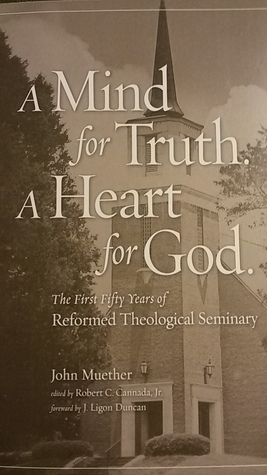 John Muether, A Mind for Truth. A Heart for God: The First Fifty Years of Reformed Theological Seminary (RTS, 2016). If you are interested in seminaries in general, the history of the conservative Reformed tradition more broadly, or RTS specifically, this will be a quick and edifying read. If you are interested in all three, as I am, you will enjoy seeing all the familiar names and learning about all the faithful men and women who have been instrumental in RTS over the past half century. Muether does a nice job of celebrating RTS—he’s a faculty member at the Orlando campus—without producing a hagiographical, institutional puff piece.
John Muether, A Mind for Truth. A Heart for God: The First Fifty Years of Reformed Theological Seminary (RTS, 2016). If you are interested in seminaries in general, the history of the conservative Reformed tradition more broadly, or RTS specifically, this will be a quick and edifying read. If you are interested in all three, as I am, you will enjoy seeing all the familiar names and learning about all the faithful men and women who have been instrumental in RTS over the past half century. Muether does a nice job of celebrating RTS—he’s a faculty member at the Orlando campus—without producing a hagiographical, institutional puff piece.
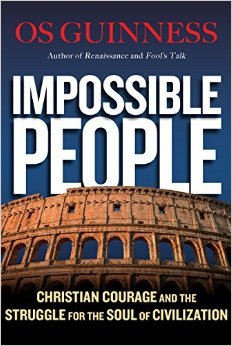 Os Guinness, Impossible People: Christian Courage and the Struggle for the Soul of Civilization (IVP, 2016). A bracing critique of secularism in the world and compromise in the church, Guinness calls Christians to be, like the 11th-century Benedictine reformer Peter Damian, “impossible people.” In other words, we should be so fierce in our commitment to Jesus and to the truth of the gospel that we are unmanipulable, unbribable, undeterable, and unclubbable. Although I found the chapters to be somewhat uneven and the connection between them loose at times, the overall force of the book is a stirring reminder that the call to spiritual warfare is a summons to stand our ground.
Os Guinness, Impossible People: Christian Courage and the Struggle for the Soul of Civilization (IVP, 2016). A bracing critique of secularism in the world and compromise in the church, Guinness calls Christians to be, like the 11th-century Benedictine reformer Peter Damian, “impossible people.” In other words, we should be so fierce in our commitment to Jesus and to the truth of the gospel that we are unmanipulable, unbribable, undeterable, and unclubbable. Although I found the chapters to be somewhat uneven and the connection between them loose at times, the overall force of the book is a stirring reminder that the call to spiritual warfare is a summons to stand our ground.
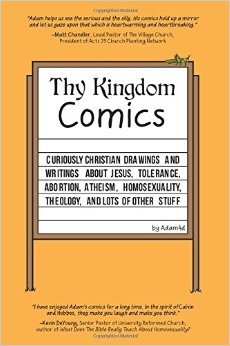 Adam Ford, Thy Kingdom Comics: Curiously Christian Drawings and Writings about Jesus, Tolerance, Abortion, Atheism, Homosexuality, Theology, and Lots of Other Stuff (Adam4d, 2016). I enjoy Adam’s comics. In this spirit of Calvin and Hobbes, they make you laugh and make you think. It’s nice to have someone this creative, fearless, and witty on the side of the angels.
Adam Ford, Thy Kingdom Comics: Curiously Christian Drawings and Writings about Jesus, Tolerance, Abortion, Atheism, Homosexuality, Theology, and Lots of Other Stuff (Adam4d, 2016). I enjoy Adam’s comics. In this spirit of Calvin and Hobbes, they make you laugh and make you think. It’s nice to have someone this creative, fearless, and witty on the side of the angels.
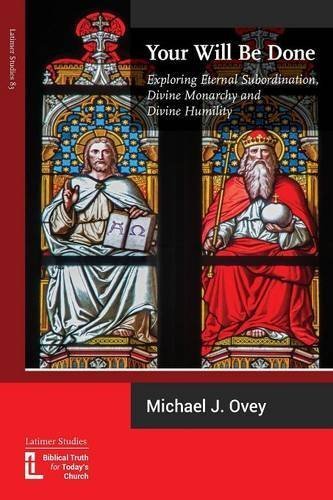 Michael J. Ovey, Your Will Be Done: Exploring Eternal Subordination, Divine Monarchy and Divine Humility (Latimer Trust, 2016). I would not describe the relationship between the Father and the Son as one of eternal subordination, and I do not agree with some of the statements from those who do. Yet I was glad to read Ovey’s book, even (maybe especially) when I found points of disagreement (e.g. some of language quoted, approvingly it seems, from Hilary and Sirmium made me cringe). Ovey’s engagement with fourth-century trinitarian thought is scholarly, technical, and careful to avoid the charge of Arianism.
Michael J. Ovey, Your Will Be Done: Exploring Eternal Subordination, Divine Monarchy and Divine Humility (Latimer Trust, 2016). I would not describe the relationship between the Father and the Son as one of eternal subordination, and I do not agree with some of the statements from those who do. Yet I was glad to read Ovey’s book, even (maybe especially) when I found points of disagreement (e.g. some of language quoted, approvingly it seems, from Hilary and Sirmium made me cringe). Ovey’s engagement with fourth-century trinitarian thought is scholarly, technical, and careful to avoid the charge of Arianism.
 Nancy Isenberg, White Trash: The 400-Year Untold History of Class in America (Viking, 2016). I thought this book would be like Hillbilly Elegy (before I even knew of that book)—a personal, heartfelt, and candid look at America’s white underclass. Instead, I found Isenberg’s book to be a winding narrative screed against the Puritans, Ronald Reagan, Sarah Palin, Charles Murray, and a host of conservatives various and sundry. If you think Murray got everything wrong in Coming Apart, and you enjoy frequent references to the movie Deliverance, this is the book for you.
Nancy Isenberg, White Trash: The 400-Year Untold History of Class in America (Viking, 2016). I thought this book would be like Hillbilly Elegy (before I even knew of that book)—a personal, heartfelt, and candid look at America’s white underclass. Instead, I found Isenberg’s book to be a winding narrative screed against the Puritans, Ronald Reagan, Sarah Palin, Charles Murray, and a host of conservatives various and sundry. If you think Murray got everything wrong in Coming Apart, and you enjoy frequent references to the movie Deliverance, this is the book for you.
September 11, 2016
Monday Morning Memory
September 7, 2016
What Does the Bible Say About Transgenderism?
 Some would argue that the Bible says nothing about the explosion of the transgender phenomenon in the Western world. After all, there is no verse that says, “Thou shalt not transition from a man to a woman.” But neither are there any verses that talk explicitly about gun violence, anorexia, waterboarding, fossil fuels, vaccines, GMOs, HMOs, or Pokemon Go. We should not expect the Bible to speak in 21st century terms to every 21st-century eventuality.
Some would argue that the Bible says nothing about the explosion of the transgender phenomenon in the Western world. After all, there is no verse that says, “Thou shalt not transition from a man to a woman.” But neither are there any verses that talk explicitly about gun violence, anorexia, waterboarding, fossil fuels, vaccines, GMOs, HMOs, or Pokemon Go. We should not expect the Bible to speak in 21st century terms to every 21st-century eventuality.
But that hardly means the Bible provides no guidance for Christians trying to make sense of our transgender moment. In fact, when it comes to transgenderism, the Bible actually has a lot to say—not by a prooftext here or there but by a rich and pervasive understanding of gender and sexual identity.
Obviously, transgenderism, as a cultural trend, is massively complex, touching on fields as disparate as genetics, fashion, medicine, law, education, entertainment, athletics, and religious liberty. We need Christians thinking through, and talking to, all of these issues. We also need Christians patiently loving, counseling, and befriending those who feel that their psychological identity as male or female contradicts their “assigned” biological sex. In asking the question, “What does the Bible say about transgenderism?” we are asking a question that can take us in a dozen different directions.
I want to focus on just one of those directions. If we are people of the Book—people who believe, like Jesus, that the Scripture cannot be broken (John 10:35)—then the transgender question, if it is to yield fruitful responses in any of these areas, must start with a biblical understanding of male and female.
And what is that understanding?
In short, the Bible teaches that God made us male or female, and no matter our own feelings or confusion, we should act in accordance with the biological reality of God’s good design. Transgenderism falls short of the glory of God and is not the way to walk in obedience to Christ.
There are three big Scriptural building blocks that lead one inexorably to this conclusion.
1. Gender Binary
The Bible knows no other gender categories besides male and female. While men and women in Scripture may express their masculinity and femininity in a wonderful diversity of ways, Scripture still operates with the binary categories of men and women. You are one or the other. The anomaly of intersex individuals does not undermine the creational design, but rather gives another example of creational “groaning” and the “not the way they are supposed to be” realities of a fallen world. Likewise, the eunuchs in Matthew 19 do not refer to sexless persons, but to men who were born without the ability to procreate or who were castrated, likely for a royal court (for more on the challenge of intersex, and the question of eunuchs, see Denny Burk, What Is the Meaning of Sex?, 169-183).
The biblical understanding of male and female is more than just an assumption writ large on the pages of Scripture. We know from Genesis 1 and 2 that the categories of male and female are a part of God’s design for humanity. Indeed, when God created the first human pair in his image, he created them male and female (Gen. 1:27). He made the woman to be a complement and help to the man (Gen. 2:18-22). Far from being a mere cultural construct, God depicts the existence of a man and a woman as essential to his creational plan. The two are neither identical nor interchangeable. But when the woman, who was taken out of man, joins again with the man in sexual union, the two become one flesh (Gen. 1:23-24). Dividing the human race into two genders, male and female—one or the other, not both, and not one then the other—is not the invention of Victorian prudes or patriarchal oafs. It was God’s idea.
2. Gender Identity
Someone with respect for Scripture may say at this point, “I agree that God makes as either male or female. But you are confusing biological sex with gender. I know transgender Christians who desire to embrace God’s design for men and women, but they also believe that who God created them to be does not correspond with the sex assigned to them at birth.” I don’t doubt that there are persons like this out there (and in our churches). While some people embracing a transgender identity may do so on a lark, many strongly feel that only by living as the opposite sex can they full embrace their true self.
The question is not whether such persons and feelings exist. The question is whether the is of our emotional or mental state equals the ought of God’s design. Most Christians reject this thinking in a host of other areas, from eating disorders to unbiblical divorces. We understand that following Christ means dying to ourselves (Matt. 16:24), being renewed in our minds (Rom. 12:2), and no longer walking as we once did (Eph. 4:17-18). Being “true to ourselves” is always a false choice when it means going against God’s Word.
As much as contemporary academia says otherwise, the Bible believes in the organic unity of biological sex and gender identity. This is why male and female are (uniquely) the type of pair that can reproduce (Gen. 1:28; 2:20). It’s why homosexuality—a man lying with a man as with a woman (Lev. 18:22)—is wrong. It’s why the apostle Paul can speak of homosexual partnerships as deviating from the natural relations or natural function of male-female sexual intercourse (Rom. 1:26-27). In each instance, the argument only works if there is an assumed equivalence between the biology of sexual difference and the corresponding identities of male and female.
3. Gender Confusion
The third building block follows naturally from the other two. If the binary of male and female is God’s idea, and if we are meant to embrace, by divine design, our biological and creational difference as men and women, then it stands to reason that the confusion of these realities would be displeasing to God. And so we see clearly in the Bible that men should not act sexually as women (Lev. 18:22; Rom. 1:18-32; 1 Cor. 6:9-10), that men should not dress like women (Deut. 22:5), and that when men and women embrace obviously other-gendered expressions of identity it is a disgrace (1 Cor. 11:14-15). We do not have an inalienable right to do whatever we want with our physical selves. We belong to God and should glorify him with our bodies (1 Cor. 6:19-20).
I have not begun to answer all the important questions about pastoral care, counsel, and compassion for the hurting and confused. But with the cultural winds gusting as they are, we cannot assume that Christians—even those in good churches—know what to think about gender or why to think it. Hopefully this brief post, and these three building blocks, can help us ensure the right foundation is in place. After all, the goal is not to build a wall to keep people out, but that God might build up his church in truth and grace that we can welcome people in, calling his image bearers to embrace the life that is truly life (1 Tim. 6:19).
September 5, 2016
Saved People Love to Sing
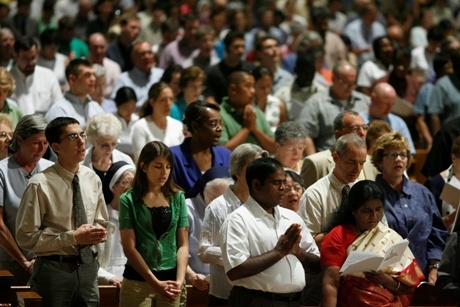 If you’ve been in church your whole life you may not realize how strange it is that when Christians get together they spend a good chunk of time just singing.
If you’ve been in church your whole life you may not realize how strange it is that when Christians get together they spend a good chunk of time just singing.
Where in our culture do you find ordinary, untrained people gathering to sing? Maybe the National Anthem or your school’s fight song. Happy Birthday, I suppose. In the car on a road trip, I guess. But really, when to adults in large numbers belt out the same song? A concert may be the closest thing, but even here the primary point is to be entertained as someone else sings. I’m not sure where you would go this week for more than three minutes of organized singing except to church.
There are many ways Christians are a peculiar people. One of them is that we almost always sing when we’re together.
There is a familiar pattern in the Bible: God saves, and his people sing. “The ransomed of the Lord will return. They will enter Zion with singing” (Isa. 51:11). And so we have songs by Moses, Miriam, Deborah, Barak, David, and Hannah. In the New Testament there are hymns to Christ in John’s Gospel, in Romans, Philippians, Colossians, 1 Timothy, 2 Timothy, and in Hebrews. There are doxologies scattered throughout the Bible and songs in Revelation 1, 4, 5, 7, 11, 14, and 15. And did I mention the Psalms?
The Bible has a lot of different people singing different things, but in another sense the Bible only has one song. The song of Moses is the song of the Lamb (Rev. 15:3). They are one and the same. They both praise God for his great acts of judgment, for his fearful holiness, for his righteousness revealed, and for the salvation his works on behalf of the redeemed. The song Moses sang on the shores of the Red Sea we will sing one day by the sea of glass (Rev. 15:2). Eternal praise for the God who is the same yesterday, today, and forever.
There was singing at creation. The Lord says to Job that when he laid the foundation of the earth “the morning stars sang together and all the sons of God shouted for joy” (Job 38:7). All the angels sang for joy at the birth of Jesus (as did Mary, Zechariah, and Simeon). Now we sing psalms, hymns, and spiritual songs to each other (Col. 3:16). The drama of redemptive history is actually a musical. Will you join the chorus?
Is the Lord your strength? Is he your song? What is your personal anthem? What do you sing about when you are free to sing about whatever you want to sing about? Sing about the Red Sea. Sing about God’s justice. Sing about his power and might. Sing about his salvation. Sing about the cross and the empty tomb. Sing now, sing later, and never stop singing. “Great and amazing are your deeds, O Lord God the Almighty!”
Saved people love to sing.



